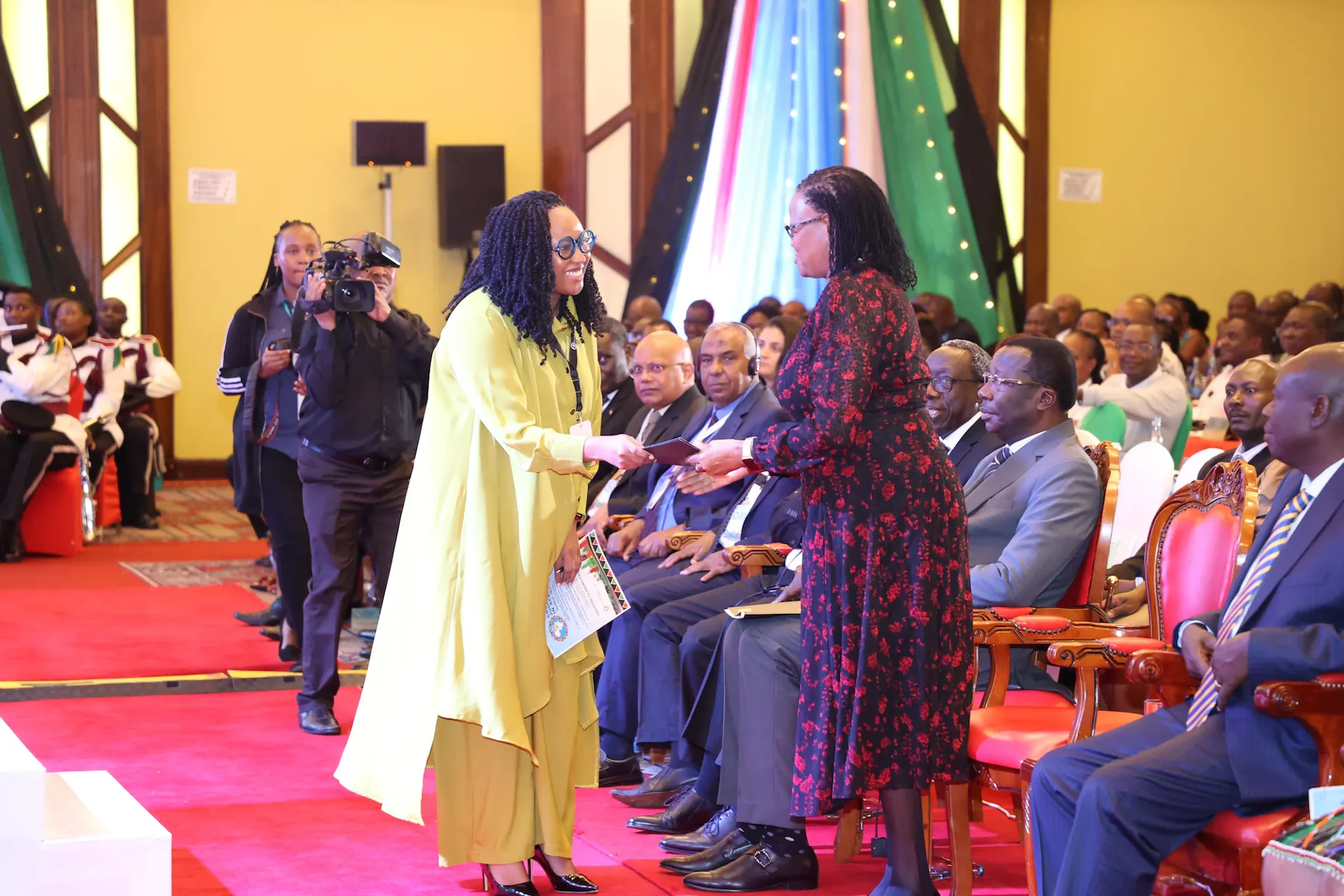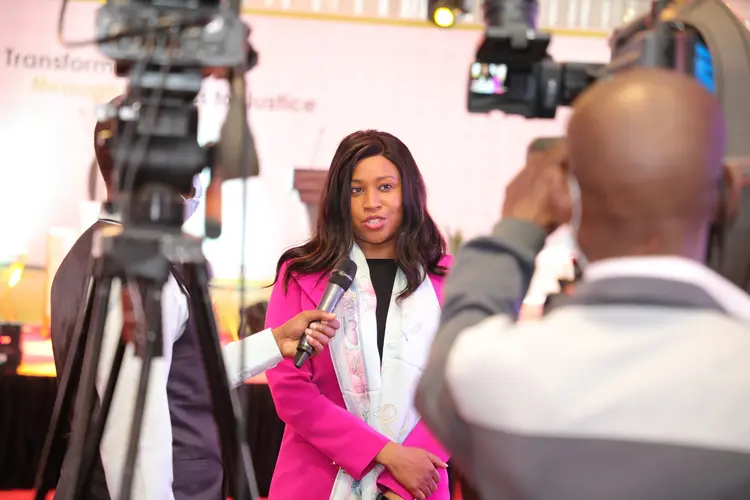
Close
result
PROFILE
The rapid and winding ascent
The rapid and winding ascent
Caroline Scotter Mainprize
5 min read

Lawyer, researcher, budding diplomat and public policy specialist: Rose Wachuka Macharia brings diverse past experiences to her position as Chief of Staff, Office of the Chief Justice of the Republic of Kenya and President of the Supreme Court of Kenya. Interview by Caroline Scotter Mainprize.
Anyone who knew Rose Wachuka Macharia as a child cannot have been surprised when she emerged in her current role as Chief of Staff to the Chief Justice of the Republic of Kenya. What they may not have imagined are the twists and turns in her career journey up to this point.
‘I remember, even when I was very young, having conversations in my mind about what made me feel most fulfilled, and my late father and I spent a lot of time talking about politics and governance,’ she says. ‘I was always organising and building systems, and was fascinated by the rules and regulations that were enforced in primary and high school for discipline. That is why I was a prefect in every class of my schooling life.’
She decided early that this fascination would translate into a professional career in the law – much to the surprise of her teacher parents, who had hoped that her interests would lean towards medicine or pharmacy. Nevertheless, Rose pushed ahead to obtain an undergraduate degree in law.
In 2009 she joined a legal practice in Kenya to work towards her bar qualification but soon found herself drawn to what was going on in the Kenyan judiciary, which was undergoing a rigorous reformation. ‘I realised then that I wanted to join the judiciary to defend the constitution,’ she says. ‘I began to feel restless in private practice because I wanted to be involved in influencing the public interest and doing something that impacted positively on people. So, when the Kenyan judiciary advertised for researchers, I applied and joined the inaugural Supreme Court.’
Rose became a law clerk for the Supreme Court, and then went to Oxford to study government at the Blavatnik School, where she focused primarily on research around healthcare and education – doubtless to the amusement of her parents. It was during her time at Oxford that her career took its first unexpected turn – she was approached by the Kenyan Minister of Foreign Affairs and invited to work with her.
It was an exciting time: Kenya was hosting the World Trade Organisation meeting that year and was also campaigning to head the African Union Commission. Rose joined the team to support the campaign and worked in the Foreign Ministry at what appeared to be the start of a glittering diplomatic career.
But then came another twist. The Minister was transferred to the Ministry of Education and asked Rose to come with her as her chief of staff.
Rose was having conversations that would lead to a posting to New York to serve the Kenya Mission to the United Nations, but ‘I said yes immediately. I didn't think about the consequences: I just knew that I wanted to come along for the ride. And that move to the Ministry of Education was the beginning of a seven-year chief of staff journey that is continuing, and also the start of some of the most monumental work that I’ve done in my career.’

It is not everyone who would give up a posting to New York in a heartbeat, but Rose puts her decision down to the close working relationship, inspiration and trust that she had already developed with her principal. That working relationship continued not only in the Ministry of Education but throughout a stint in the Ministry of Sports, Culture and Heritage which lasted throughout the COVID pandemic and culminated in preparing the Kenyan Team to participate in the Olympic Games in Tokyo.
However, political jobs by definition come to an end, and Rose was adamant that she did not want to be caught up in a transition after the elections in 2022. Once again, she had a choice to make between a big international job (Public Affairs Adviser to the Commonwealth Secretary General) and an equally big but national one – Chief of Staff to Kenya’s first woman Chief Justice, Martha Koome.
‘Kenya had never had a woman Chief Justice since the judiciary was established over 100 years ago,’ says Rose, ‘and as a young lawyer it had been a dream to see that ceiling broken. It was a tough decision to make, as I already had some obligations to the Commonwealth Secretariat, but ultimately, I took the national posting. I stayed in Kenya to help the Chief Justice formulate a vision for her tenure, build a team, systems, and connections to put together a strategy that we could then implement for the 10 years that she was going to be in office. And that’s where I am today.’
Considering the importance she places on the working relationship between chief of staff and principal, it is interesting to note that Rose had not met either of her principals before being invited to discuss working with them as chief of staff. However, she had been recommended to them by people who knew her well. Once they met, she would present her credentials as ‘someone who had worked in the public sector and demonstrated capacity in building systems and rallying support behind the principal.’
Most valuably, perhaps, ‘I love leading from the shadows. I love picking up my principal’s ideas, challenging and refining them and then building implementation programmes around them. What counts is the convergence of purpose. Not just what is the principal like, but what do they believe in? What is their level of integrity? How well can we communicate? It mattered to me as I built my own leadership capacity that I anchored myself with leaders who demonstrated the values that I believe in and that for me has been an amazing learning curve.’
In fact, she suggests that impactful leaders lead from the margins, because ‘you’re always supporting and facilitating somebody – the people. Even the President is answerable to Parliament or to the Judiciary in certain instances and vice versa. That is the system that democracies adopt – check and balances, and it’s through that understanding – of service and accountable engagement that successful leadership happens’.

Rose Wachuka Macharia
Chief of Staff, Office of the Chief Justice & President of the Supreme Court of Kenya
Instrumental in supporting Kenya's first Lady Chief Justice, Rose has led the development of the transformative 10-year Blueprint for Access to Justice, guiding judicial priorities for the next decade. Her work in championing the Chief Justice's strategic initiatives for the Kenyan Judiciary is crucial in promoting fairness and accessibility, enhancing the impact of justice on social transformation.
Rose's commitment to justice and human dignity underscores her pivotal role in shaping a fairer and more just future. Recognised as one of Kenya's Top40Under40 Women and a global leader in the advancement of human rights, especially the rights of women and girls, her leadership is a beacon of inspiration. Join us as we continue to explore the impactful contributions of chiefs of staff worldwide.








